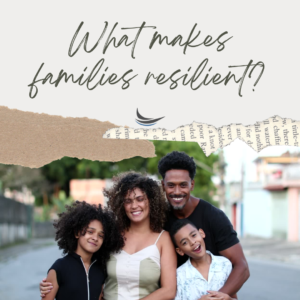 Hardship does not just impact individuals, but also families. Have you ever wondered what-makes-families-resilient? Family Resiliency is defined as the family’s ability to “withstand and rebound from disruptive life challenges, strengthened and more resourceful” (Walsh, 2011, p 149). Dr. Walsh is an expert of family resiliency. Dr. Walsh’s research in resilience-theory provides nine family resilience processes that interact, while strengthening the family unit and cultivating resources with the family system. This framework is applicable to a wide variety of family structures including created families and adoptive, foster, and kinship families.
Hardship does not just impact individuals, but also families. Have you ever wondered what-makes-families-resilient? Family Resiliency is defined as the family’s ability to “withstand and rebound from disruptive life challenges, strengthened and more resourceful” (Walsh, 2011, p 149). Dr. Walsh is an expert of family resiliency. Dr. Walsh’s research in resilience-theory provides nine family resilience processes that interact, while strengthening the family unit and cultivating resources with the family system. This framework is applicable to a wide variety of family structures including created families and adoptive, foster, and kinship families.
I am going to share an example of what resilience might look like in a family using the nine processes with an example of a high school senior who will be missing their graduation due to battling a medical condition during a significant milestone and life transition.
Belief Systems (meaning making, positive outlook, transcendence/ spirituality)
A resilient family seeks to support from each other and their social supports to help normalize their emotional distress and lean on each other during a challenging time. They utilize the help of their teen’s medical team, and religious or other community supports. They have hope that their child will have the best change for a full recovery
Organizational Processes (flexibility, connectedness, social & community resources)
A resilient family works together to reorganize roles that are disrupted by their child being in a long-term hospitalization. They seek to provide predictability for their teen and any other children/ family members to maintain consistency in their schedules, despite frequent travels to and from the hospital. Mutual support is provided, as each person is committed to the process and to each other. The greater community comes together to assist in providing supports, for example to help ease the burden of costly medical expenses.
Communication Processes (clear information, emotional sharing, problem-solving/ prevention)
Information is provided to each person in the family regarding what is happening in a consistent, yet age-appropriate messaging. Each person is encouraged to share their emotional experiences, and have these emotions be validated. Family members may be connected to an individual therapist, family therapist, and/ or group support. The family works together to solve problems collaboratively such as finding a way to honor their child’s important milestone of graduation even though it may look different than anticipated. The family emerges even stronger together as they work together during a time of crisis.
Written By : Charlotte Johnson, MA, LPCC
We’re Here to help
Our wellness experts will be happy to take care of you. You can CLICK HERE to schedule an appointment now or call (612)223-8898.
Meet Clinicians
We’re united by our commitment to providing effective, relevant, and innovative mental health support at all stages of your journey. Click Here to find out more about who we are, where we come from, and how we live out CARE’s mission every day.
The professionals at CARE are actively collecting and creating resources to help with what you need. We’re Here for You.



